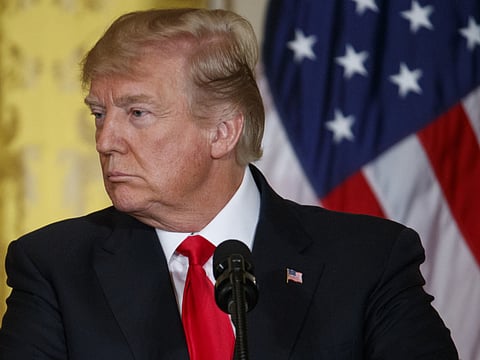Why BuzzFeed published the Trump dossier
One year ago the news site published in full unverified claims about Russia collusion by former intelligence officer Christopher Steele

Exactly one year ago BuzzFeed published what’s now known simply as ‘the dossier’: a set of reports put together by a former British intelligence officer named Christopher Steele during the 2016 presidential campaign. The 35-page dossier suggested that the Russian government had both compromised and colluded with President-elect Donald Trump.
Our choice to publish the dossier was greeted by outrage from two sources. Journalistic traditionalists didn’t like the idea of sharing an unfiltered, unverified document with the public, whatever the caveats and context. NBC’s Chuck Todd told me on air, “You just published fake news.” Trump agreed. He described CNN’s reporting on the dossier as “fake news” and called BuzzFeed a “failing pile of garbage.”
But a year of government inquiries and blockbuster journalism has made clear that the dossier is unquestionably real news. That’s a fact that has been tacitly acknowledged even by those who opposed our decision to publish. It has helped journalists explain to their audience the investigation into Russian influence on the 2016 election. And Trump and his allies have seized on the dossier in their efforts to discredit the special counsel leading the investigation, Robert Mueller.
Without the dossier, Americans would have found it difficult to understand the actions of their elected representatives and government officials. Their posture toward Trump was, we now know even more comprehensively than we did in January 2017, shaped by Steele’s report. The Russia investigation, meanwhile, didn’t turn out to be some minor side story but instead the central challenge to Trump’s presidency.
When we published the dossier, we knew a lot: We knew that it had been written by the former head of the Russia desk at Britain’s main foreign intelligence agency, a man whose job had made him a leading source on Russian espionage. We knew that key members of the Senate — Harry Reid, the Nevada Democrat, and John McCain, the Arizona Republican — had acted on its contents. We had also learnt that intelligence officials had briefed President Barack Obama and President-elect Trump on the dossier, and that the FBI was already looking into it.
We didn’t discount the arguments against publishing salacious allegations — which reporters do all the time in covering lawsuits, internal investigations or reports like Steele’s. And we understand why Trump’s supporters remain furious at the airing of a disturbingly vivid unproven allegation about encounters with prostitutes.
But we never bought the notion, made by the traditionalists, that a main threat to journalism is that journalists might be too transparent with their audience. Keeping the reporting process wrapped in mystery only helps those who oppose the free press. This is why The New York Times posts leaked audio recordings, and why news organisations routinely publish raw court documents underlying their articles.
We strongly believed that publishing the disputed document whose existence we and others were reporting was in the public interest.
Since we published, the public has learnt a great deal more about how seriously the FBI took the dossier. The FBI, CNN reported, used the dossier to justify its effort to spy on an American citizen, and reimbursed Steele for some of his expenses. The BBC reported that the dossier was a “road map” to the FBI investigation. Fox News recently reported that a top Department of Justice official met with Steele during the 2016 campaign. And on Tuesday, the public was given a glimpse, in the release of secret testimony, into the fierce battle between Senate Democrats and Republicans over the dossier and how the FBI made use of it during the 2016 campaign.
As the seriousness of the Russia investigation has become clearer, the pro-Trump line has shifted from dismissing the dossier to stressing its role in the investigation: The dossier, some of Trump’s defenders now say, played too big a part, given that a portion of Steele’s funding came from political enemies of Trump, including the Democratic National Committee. “Are we in the midst of a major criminal investigation against the president of the United States as a result of this dodgy dossier?” asked Tom Fitton, a Trump ally, on ‘Fox & Friends’ recently.
While Trump’s camp dismiss the dossier as malicious fiction or pure political opportunism, some elements have been corroborated. For example, that the Trump campaign chairman Paul Manafort hid payments for his work in Ukraine, as federal authorities have alleged; that the Russian diplomat Mikhail Kalugin was withdrawn suddenly from the United States; and that Trump sought, but never consummated, business deals in Russia.
Steele also reported, in pages submitted just 11 days after a Russian lawyer reportedly promised Trump’s aides negative information on Hillary Clinton during a meeting in Trump Tower, that “the Kremlin had been feeding Trump and his team valuable intelligence on his opponents, including Democratic presidential candidate Hillary Clinton.”
“One large portion of the dossier is crystal-clear, certain, consistent and corroborated,” a CIA veteran, John Sipher, wrote recently. “Russia’s goal all along has been to do damage to America and our leadership role in the world.”
For all these reasons, the chorus of criticism of our decision to publish has faded. I haven’t had a single person approach me to say, “I wish I hadn’t read the dossier, and wish I had less insight into the forces at play in America.” Do you feel that way? Does anyone?
— New York Times News Service
Ben Smith is the editor in chief of BuzzFeed News



